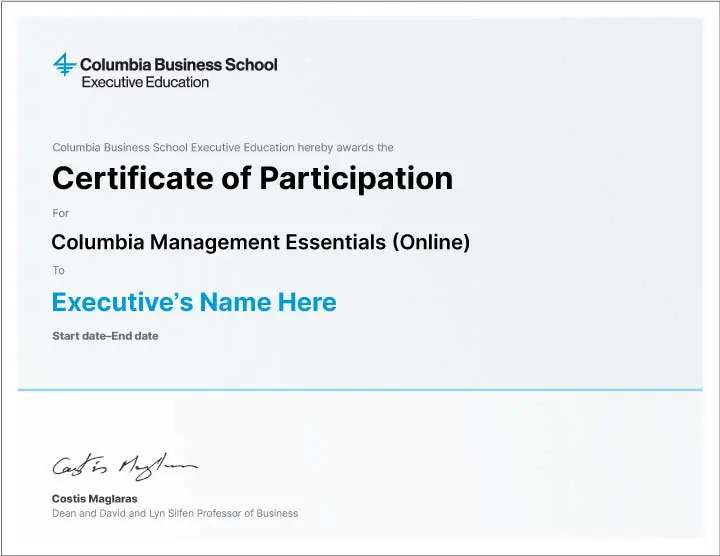Columbia Management Essentials (Online)
Early Registration Benefit
Apply now to secure your place at Invalid liquid data byInvalid liquid data.
Connect with a learning advisor for more information.
Key Takeaways
The Columbia Management Essentials (Online) program will enable you to:
Explain leadership styles and their impact on team dynamics
Apply the six steps to a rational decision model and six psychological truths to a group case study
Identify influencing techniques as they apply to leadership and customer service
Compute values expressing customer lifetime value (CLV), present values, and capital budgeting rules
Match ideation templates with product development scenarios
Compare networking options and their benefits
Compare case study data regarding cash flows with OTC and mobile wallet models
For full details of the curriculum, please download the brochure.
Who Should Attend
Newly appointed managers looking to learn financial and leadership fundamentals as they advance into the management of people, projects, and products
Aspiring managers seeking to develop their leadership and decision-making capabilities needed for future managerial roles in a range of industries
Mid- to senior-level managers interested in enhancing their business experience with the latest marketing, finance, and leadership strategies taught by Columbia Business School Executive Education
Program Modules
Program Experience

World-Renowned Faculty
Learn from accomplished faculty, and industry experts whose diverse backgrounds encompass a broad range of disciplines

Peer Interaction
Stimulating discussions with like-minded global peers expand your professional network and build a supportive community

Engaging Assignments and Activities
Hone business acumen and executive skills with try-it activities that help you redefine your potential

Case Studies
Through exploratory sessions, examine practical examples and find innovative solutions to strategic challenges
Participant Testimonials
Program Faculty

Meyer Feldberg Professor of Business in Marketing

Professor of Business, Marketing

Paul Calello Professor of Leadership and Ethics

Family Business Program, Chair of Finance Division, Stefan H. Robock Professor of Finance and Economics

Reuben Mark Professor of Organizational Character

Certificate
Upon completion of the Columbia Management Essentials (Online) program, you will receive a certificate of participation from Columbia Business School Executive Education. This certificate also awards two credits towards the Certificate in Business Excellence, which grants select alumni and tuition benefits. Learn More
Your digitally verified certificate will be issued in your legal name and emailed to you, at no additional cost, upon completion of the program, including all modules of the program (online, in person, or live online, inter-module). All certificate images are for illustrative purposes only and may be subject to change at the discretion of Columbia Business School Executive Education.
FAQs
Financing Options
Climb Credit*
We offer financing options with our partner, Climb Credit*. Click here to learn more. *Applicable for US Residents
Flexible Payment Options For All
Flexible payment options allow you to pay the program fee in installments. Click here to see payment schedule.
Didn't find what you were looking for? Write to us at learner.success@emeritus.org or Schedule a call with one of our Program Advisors or call us at +1 315 387 4431 (US) / +44 203 838 0836 (UK) / +65 3138 4449 (SG)
Early registrations are encouraged. Seats fill up quickly!
Flexible payment options available.
Starts On

